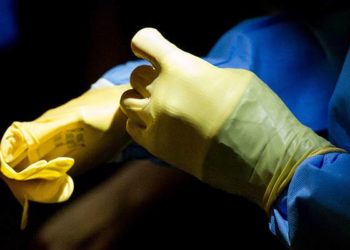Limited cardiovascular effect of diet and exercise in obese type II diabetics
Image: PD
1. There was a no difference in cardiovascular outcomes between obese type II diabetic patients engaged in lifestyle intervention (intense diet and exercise) versus a control group (education and support services).
2. Patients in the intervention group and control group had 1.83 and 1.92 cardiovascular events per 100 person-years, respectively (P=.51).
Evidence Rating Level: 1 (Excellent)
Study Rundown: Diet and exercise as a regimen for weight loss has long been prescribed for obese patients suffering from Type II diabetes. This clinical trial investigated the effect of an intensive lifestyle intervention (diet & exercise) on cardiovascular morbidity and mortality, finding that there was no significant difference as compared to education and support services. The intervention group encountered 403 events (pool of 2570 patients), while the control group experienced 418 events (pool of 2575 patients). Researchers argued that the weight loss in the intervention group may have not been significant enough to influence cardiovascular events; however the weight loss in the group was on par with other lifestyle intervention studies.
Although exercise and diet has been correlated with other positive health outcomes, this research supports the conclusion that lifestyle interventions for obese patients with type II diabetes have only marginal influence on negative cardiovascular events. Researchers did not provide significant demographic information (i.e. age) regarding the participants who experienced cardiovascular events. This information may provide insight into how interventions at different ages impact these outcomes.
Click to read the study in the New England Journal of Medicine
Click to read an accompanying editorial in New England Journal of Medicine
In-Depth [randomized control trial]: The study (n=5145) was administered across 16 different sites with follow-up for over 9 years. Participants were randomly separated into intervention and control groups. The intervention group (n=2570) underwent intense diet, exercise and counseling programs, while the control group (n=2575) was provided education and support services. In year one there was significant weight loss in the intervention group (8.6%) with diminishing returns over time, the average difference in weight loss between the two groups was 4%.
Patients selected for this study were all between the ages of 45 and 75 (avg. age = 58.7), had a BMI >25 (avg. BMI=36.0. Intervention group 35.9 +/- 6.0; control group 36.0 +/- 5.8), and were diagnosed with type II diabetes (avg. diagnosis = 5yrs). The intervention group underwent intense diet (1200-1800 kcal per day) and exercise (175 minutes per week) counseling for six months with check-ups scheduled periodically during the follow-up period. There was no difference between myocardial infarction, stroke, hospitalization due to angina, coronary intervention, and cardiovascular related death between the intervention and control groups (1.83 and 1.92 events per 100 person-years, respectively, P=.51).
By Jordan Anderson and Andrew Bishara
More from this author: Slowdown in healthcare costs linked to economic and clinical factors; Economic incentives alter nutritional patterns in South Africa; Emerging coronavirus found to spread in healthcare facilities; CT scans linked to cancer risk in children; Slowdown in healthcare costs linked to economic and clinical factors; Breast implants linked with later stage breast cancer, mortality; Contraband tobacco leads to reduced smoking cessation; Circulating tumor DNA used to monitor metastatic breast cancer; Salt intake linked with autoimmune disease; Continuity in diabetes provider improves outcomes and decreases costs;
© 2013 2minutemedicine.com. All rights reserved. No works may be reproduced without written consent from 2minutemedicine.com. Disclaimer: We present factual information directly from peer reviewed medical journals. No post should be construed as medical advice and is not intended as such by the authors or by 2minutemedicine.com. PLEASE SEE A HEALTHCARE PROVIDER IN YOUR AREA IF YOU SEEK MEDICAL ADVICE OF ANY SORT. Content is produced in accordance with fair use copyrights solely and strictly for the purpose of teaching, news and criticism. No benefit, monetary or otherwise, is realized by any participants or the owner of this domain.







